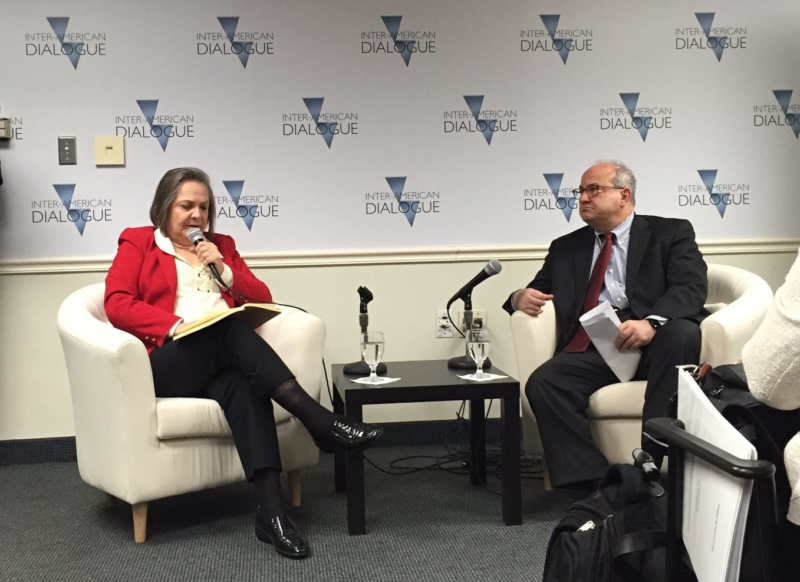A Conversation with Clara López, Minister of Labor of Colombia
 Missy Reif / Inter-American Dialogue
Missy Reif / Inter-American Dialogue
On Wednesday, July 6th, the Dialogue held a conversation with Clara López, the Colombian Minister of Labor. The peace process with the FARC was the main topic of discussion as the Minister shared her outlook on the post-conflict scenario. Its implications for the labor sector and the Labor Action Plan between the United States and her country were also focal points.
Minister López began by describing the peace and reconciliation agreement as “a new social contract – a New Deal, like Roosevelt said in the 30s”, one that constitutes “the grandest effort the Colombian people have to overcome.” The list of benefits from the peace deal, besides a presumed end to violence, would include a permanent increase between 1% and 2% in the potential growth rate in GDP, an increase in FDI and consumption levels, and improved incomes for victims of violence.
The peace agreements also mean a positive outlook for the improvement of conflict-era labor issues. Minister López described how “unions have been stigmatized as being a part of the guerilla movement”, and how polls show that a good percentage of members of the business community see union leaders as guerilla leaders. Through the Labor Action Plan – a five-year-old component of the US-Colombia free trade agreement – publicity was used to show how unions weren’t guerillas and measures were taken to protect union workers and punish aggressors. With the peace accords, violence against unions might decrease as a perceived association between them and guerillas is eroded. On the other hand, an issue that will remain for the labor sector in the post-conflict is the dual economy in which nearly half of the labor force is in the informal sector and only 3% of the workforce is unionized. Such levels of informality, said López, need to be addressed through measures such as substantial dialogue between the government, employers, and unions in order to improve employment programs and not just hand out labor laws by decree.
Hoy en @The_Dialogue hablando de #EmpleoEnColombia #LaborInColombia el moderador @MichaelShifter pte de IAD. pic.twitter.com/5hdI9EpkVB
— Clara López Obregón (@ClaraLopezObre) July 6, 2016
Though the Minister highlighted how peace is necessary in order to overcome violence and persisting social inequalities, she recognized that “peace isn’t an easy way,” and that there will be short-term costs during the transition period. Namely, she projected an increase in public spending (of 1% to 3% of GDP) in order to tend to renewed necessities for health, education, training, and rule of law programs in (especially rural) areas affected by the war. Given the recent decline in oil prices, which caused a sharp drop (about 20%) in oil revenues for the government, Santos’ administration will have to face budgetary hardships during this period and a “special tax effort” may be necessary. Another note of caution raised by the Minister was the fact that the ELN and demobilized paramilitary groups continue to function as criminal and guerilla forces. López mentioned that, while such groups still have large territorial control in areas of the country, the government is beginning to incorporate the ELN into an agreement for peace
Hopefully, the peace agreement will finally be signed by the end of this month, said López. In the end, it will be the Colombian people – through a referendum – who decide to accept or reject the deal. The Minister acknowledged the currently fragmented state of politics in the country, with some—most prominently, former President Uribe—wanting a different kind of peace and some leftist groups wanting a peace without Santos, all while the FARC is trying to trade bullets for votes and enter the political stage. In the end, however, she emphasized the fact that whatever divergences might exist amongst political groups, individuals, and those on different ends of the negotiating table, the key message of the peace talks has been that Colombia must find common ground in order to move forward in a democratic way. Only by working and agreeing on issues together, she noted, can its people learn to live in peace and settle their differences.



















